![]()
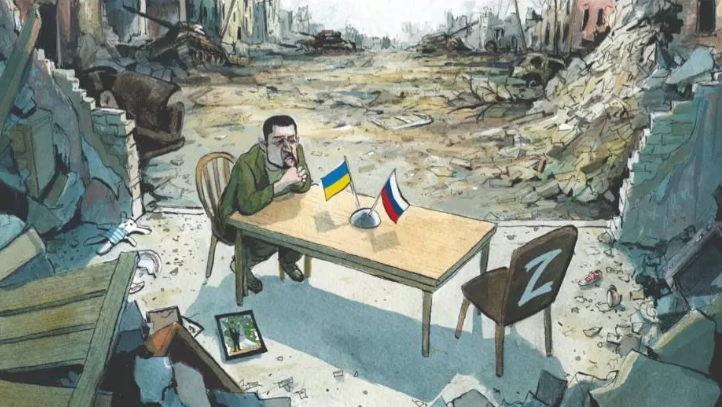
by SIMPLICIUS THE THINKER
Mainstream publications have fired another salvo of articles this week conveying a cratering outlook for Ukraine. Let’s take a run through the gamut to see just how urgently the tone has shifted, and what it portends.
The first piece is from Foreign Affairs—the official journal of the CFR—written by CFR ex-president Richard Haass (remember him?). Note the deliberately chosen cemetery motif to define the tone:
It lays out the urgency in no uncertain terms, using very direct language to exhort the U.S. and allies into immediately reorienting Ukraine’s posture from an offensive to a defensive one.
Ukraine and the West are on an unsustainable trajectory, one characterized by a glaring mismatch between ends and the available means…
The United States should begin consultations with Ukraine and its European partners on a strategy centered on Ukraine’s readiness to negotiate a cease-fire with Russia and to simultaneously switch its military emphasis from offense to defense. Kyiv would not give up on restoring territorial integrity or holding Russia economically and legally accountable for its aggression, but it would acknowledge that its near-term priorities need to shift from attempting to liberate more territory to defending and repairing the more than 80 percent of the country that is still under its control.
The article goes on to make a series of concessions that tear through the veil of lies still being wimpled over the public by most pro-UA sources:
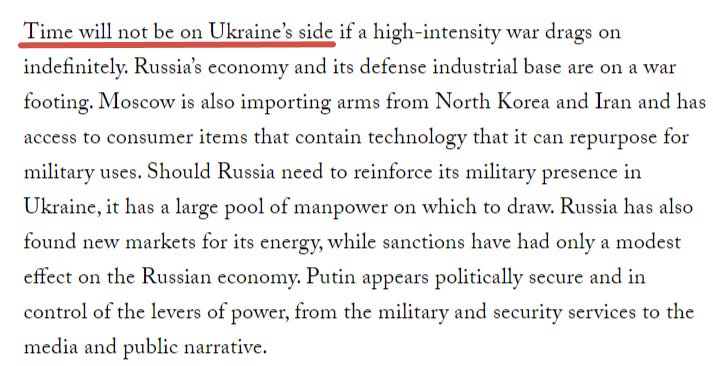
In short: Time is on Russia’s side, Russia’s economy is completely invulnerable to sanctions and is booming, Moscow has true friends and allies who support it, a massive, untapped manpower pool, and Putin is politically unassailable. Haass wastes no words in cutting straight through the illusions to lay it out in as direct and urgent manner as possible for what he perceives to be the still-stupefied intelligentsia.
But here’s where the crux of his strategy comes into play:
Even if Russia were to reject a proposed cease-fire, it would still make sense for Kyiv to put one on the table. Doing so would allow Ukraine to seize the political initiative, reminding publics in the West and beyond that this war remains one of Russian aggression. The Kremlin’s rejection of a cease-fire would help Western governments maintain and tighten sanctions against Russia and help Ukraine nail down long-term military and economic support.
He essentially wants the ceasefire as lure and trap, knowing Russia will reject it, but in doing so will help re-center the narrative of the conflict on Russia as aggressor and peace-spurning bad guy. He believes this could be a jolt to Western solidarity on the Ukrainian issue.
He concludes with more generic advice about joining NATO to secure Ukraine’s future, which continues to be an ongoing theme from other current publications:
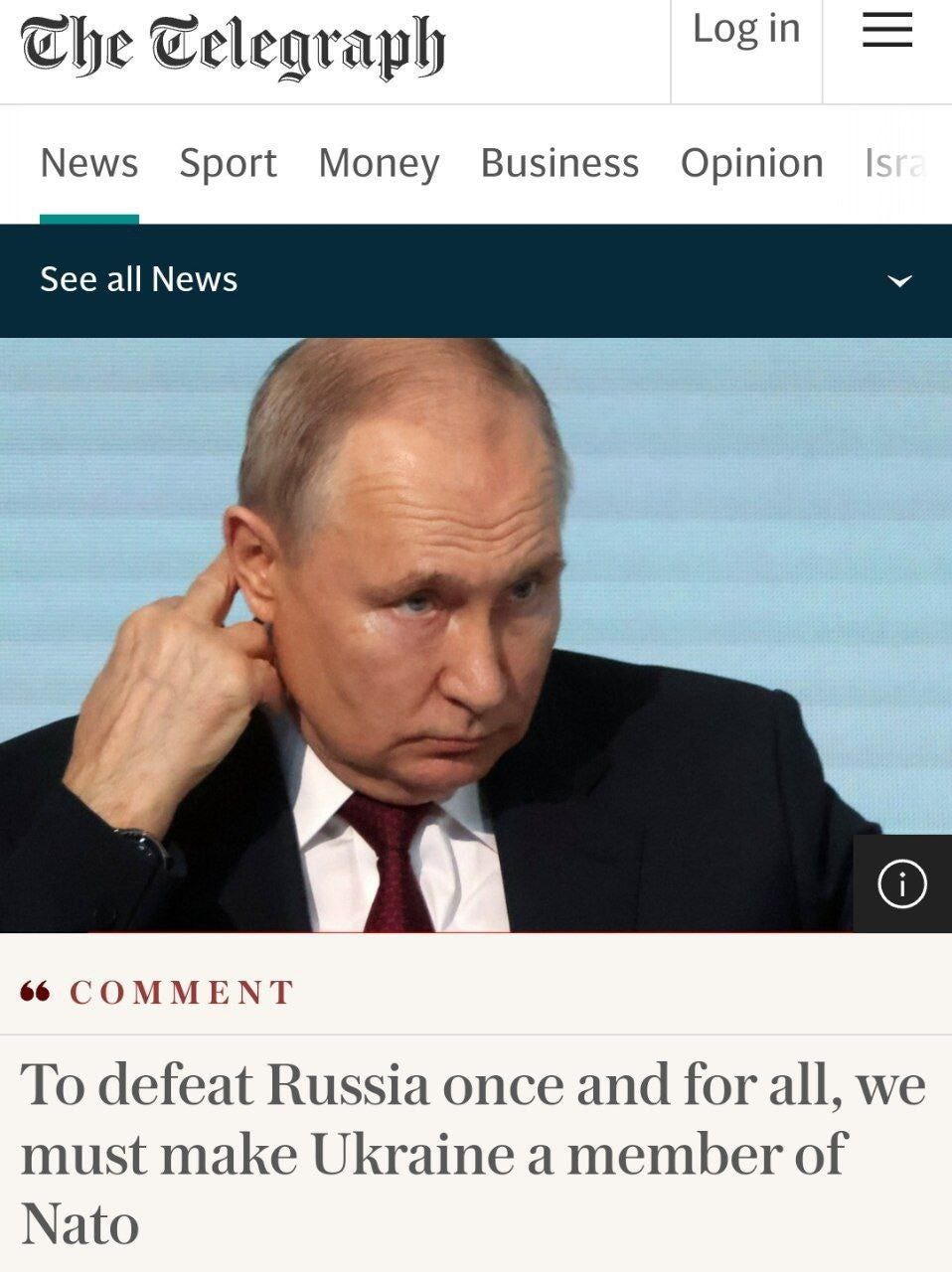
The other big article which agrees with the above, and is also written by another think-tank bigshot is the following WSJ piece:
Let’s first note that when a highly coordinated campaign of issuances from the big legacy institutions comes carrying water for think-tank bigwigs, it usually denotes some sort of critical guidance from the ruling cabal above towards their political underlings.
The piece begins in almost identical form, as if a ChatGPT bot has simply scrambled the precise wording of Haass’s earlier piece but kept the same messaging. It states that Putin’s confidence is hard to miss, and goes on:
Putin has reason to believe that time is on his side. At the front line, there are no indications that Russia is losing what has become a war of attrition. The Russian economy has been buffeted, but it is not in tatters. Putin’s hold on power was, paradoxically, strengthened following Yevgeny Prigozhin’s failed rebellion in June. Popular support for the war remains solid, and elite backing for Putin has not fractured.
The above is backed by another new piece by Mark Galeotti from UK’s TheTimes:
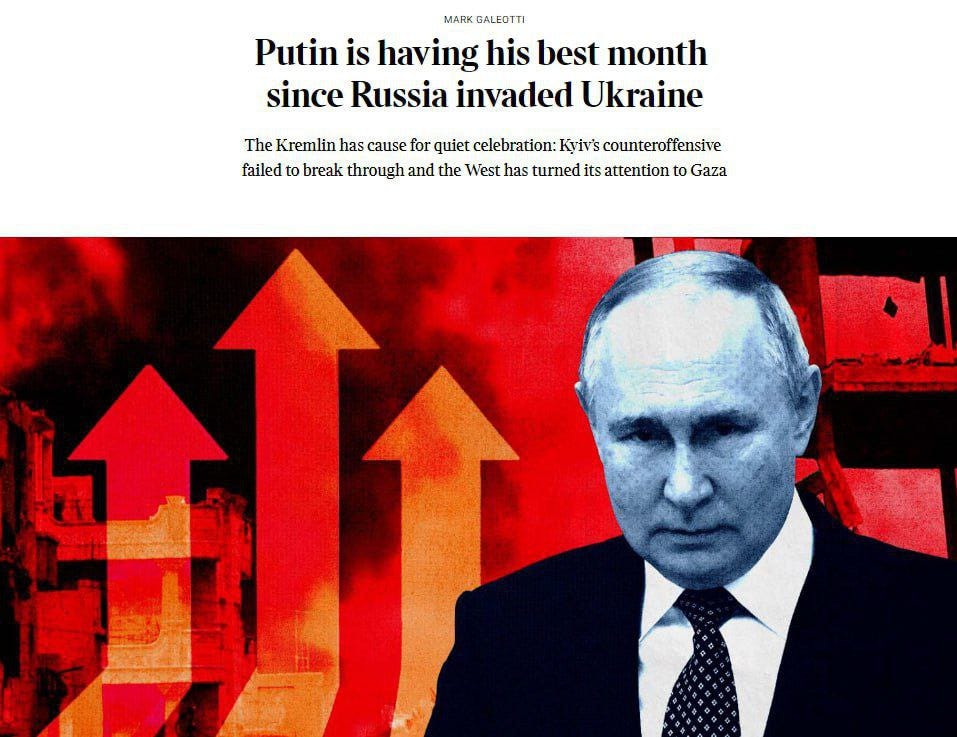
The coordinated messaging is really being thrown at us.
But getting back to the WSJ piece, it too continues with a series of stark concessions:
Meanwhile, sanctions and export controls have impeded Putin’s war effort far less than expected. Russian defense factories are ramping up their output, and Soviet legacy factories are outperforming Western factories when it comes to much-needed items like artillery shells.
Even a real eye-opener amongst them:
The technocrats responsible for running the Russian economy have proven themselves to be resilient, adaptable, and resourceful. Elevated oil prices, driven in part by close cooperation with Saudi Arabia, are refilling state coffers. Ukraine, by contrast, depends heavily on infusions of Western cash.
It’s true, Bloomberg recently confirmed the massive $75B surplus:

This stems from the fact that the “price cap” on Russia’s oil has completely failed and Russia sells all of its oil well above the arbitrarily and illegally imposed cap:

The WSJ piece continues in its approbatory tone, noting how Russia’s allies have supported it, but oddly misconstruing its partnership with China by slighting Russia as a “junior partner.” This is an oft-repeated trope and canard in Western circles. But ask yourself, is there a single country on the planet that can be rightly deemed “senior partner” to China—or even equal partner—considering China’s economic inimitability? At this point the answer is likely no, so being “junior partner” is fairly self-evident and trivial, even though China certainly doesn’t view Russia in such infantilized and condescending terms.
They go on to concede that “Putin does not feel any pressure to end the war or worry about his ability to sustain it more or less indefinitely.”
The article then disingenuously blames Russia for all the escalations and rescinded Cold War era agreements of the past few years, when it was in fact the U.S. as the aggressor and instigator in every case. It unspools the same barren, unimaginative spiel about the West needing a long term strategy to contain Russia, with the given reason being that a Russian victory presents some sort of specter over Europe.
These ‘policy-crafters’ have very little self-awareness, as they don’t seem to realize that the very same sterile barrenness of their ideas is the true analgesic for stultified Europeans, who can’t find convincing enough reason to care with the selfsame overwrought alarm, because no actual reason exists. Anyone with eyes and brain can see Putin is not the ‘threat’ he’s sketched out to be, and that he’s in fact merely reacting to NATO’s own encroaching threat on his border.
The Spectator too joined the fray yesterday:
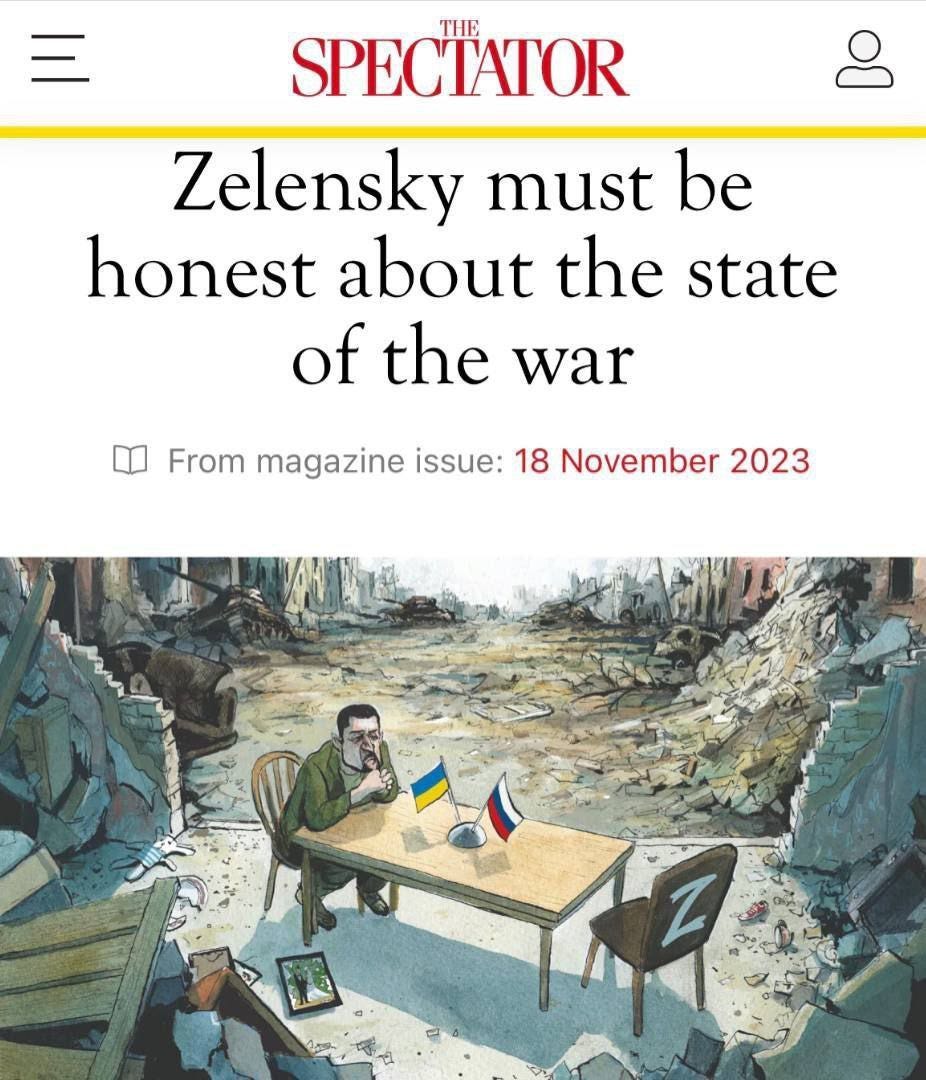
The piece details the Zelensky-Zaluzhny feud, and goes on to highlight the divide between what’s presented to the public and what’s nakedly visible on the actual frontlines:
A split is emerging between the soldiers on the front line who know how desperate things are, and the civilians in the cities who believe that the 700,000 people who have been drafted since last February are sufficient to win in some meaningful sense. I spent time on both sides of the divide earlier this year, and saw this perception gap for myself. The soldiers I talked to in the Donetsk region told me their brigades were so understaffed that they were not allowed home: some had been in the battlefield for 18 or even 20 months; others had spent more time at war than at home since 2014.
And then comes another stark admission:
There are few replacements for the fallen and wounded: the days of people queuing at recruitment offices are long gone.
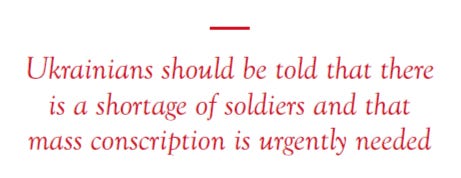
The article relays a ‘growing sense that conscription will eventually take every man’.
In the next few weeks, we will begin to see the build-up to another wave of conscription, now called ‘recruitment’…
The front line will need reinforcements – but that means a frank conversation with the public about the true state of the war. The battalions are thinning, soldiers are tired while fighting is constant. This week, for example, Russia has been trying to encircle Ukrainian troops in Avdiivka, a city in the Donetsk region. Just keeping the Russian army where it is is a struggle that requires the nation’s full efforts.
The truth just keeps tumbling out; confessions like the following would have gotten you ejected and silenced just months ago, now they’ve become a household plea:
So the Ukrainian authorities have two choices: they can keep going with the boosterism and persist in trying to convince everyone that the fighting is going according to plan – or they can start an honest conversation about what’s actually happening.
It’s not just the Ukrainian authorities who avoid unpopular topics, but also the western allies, who crave the sight of heroic Ukrainian fighters making stunning advances, rather than struggling for every trench. Kyiv and Washington may discuss the war without embellishment in private but not in public – and to explain to the world why this war is so hard to win, and why Ukraine needs to continue to be given help anyway, puts at risk the patience and sympathy upon which Ukraine’s survival depends. There should be no shame in acknowledging the truth: Ukraine faces an enemy with superior weaponry, technology and manpower.
The article ends on a rather morbid note, basically implying that Zelensky should continue sacrificing more lives with the nastily condescending hypothetical of whether Ukraine is “willing to make the sacrifice” in order to not pay a “higher price”—insultingly insinuating the sacrifice they’ve already made isn’t enough.
And for Ukraine? Zelensky must talk frankly about the sacrifices that will be required to keep Russian forces at bay for another year. Ukrainians have shown their unity and resilience when they need to defend their homeland. The real question is the extent of the sacrifice everyone is willing to make – and what the most probable outcome will be if they choose not to pay that price any more.
But you see, in many ways, this is Ukraine’s own doing—they’ve dug their grave with the propaganda games they’ve played. By continually downplaying their own losses throughout the war, Ukrainian authorities have instituted the blanket belief through the entire establishment clerisy that there’s far more ‘room’ to expand in the ‘sacrificial’ category. If these pundits and theorists actually knew the real numbers of Ukrainian losses, I wager that even they would balk at prolonging this ongoing massacre.
But because—out of desperation—Ukraine feels the need to over-embellish their numbers to such a wanton degree, these apparatchiks have no choice but to expect ‘more room for growth.’ And so this absurd situation arises where they egg on a walking corpse, assuming it to be in tip-top shape. Think about it, if you were made to believe that Russia had 300k dead while Ukraine only had 40k, wouldn’t you also feel confident urging on the heroic David to finish off the wounded Goliath?

But let’s move on to some new, more detailed accounts which support much of the theorizing and pontificating seen above in the more ‘prestige publications,’ and also chart a forward outlook on what can be expected.
In light of all the urgent exhortations for Ukraine to switch to a defensive posture, there’s been a series of new revealing accounts regarding the deteriorating ammo situation on the front. The fact that it comes from several unconnected sources, which corroborate each other, is telling; and there are some very interesting details.
It starts with the account of a Ukrainian officer on the Avdeevka front who gave an interview to the El Pais outlet just days ago.
His first interesting admission is that the casualties are high on both sides. Speaking of the fights along the Stepove railway tracks, he states:
We do not have control, in a day we can take and lose three times each and the positions there, the fights are 30 metres,” explains Ivan, “do not stop coming, in platoons of 10 to 15 men. Do not cease to be”. The casualties on the side Russian are innumerable, says Ivan, but on the side in Ukrainian are also very high: he has lost all his platoon, 17 companions, including dead and taken prisoner by the enemy.
Firstly—as standard he has to season it with some stuffing about Russian casualties. We know this is nonsense; of course there are higher casualties here than more static fronts, as Russia is on the attack. But we now know they’re no where near as high as UA propaganda claims, and Russian forces affirm their casualties are much lower than that of the Ukrainians. I haven’t seen a single account on the Russian side describing their entire squads, platoons, etc., being taken out. Yet here, the UA officer admits losing his entire platoon. Hell, just today there was a potential report of an entire AFU company surrendering there:
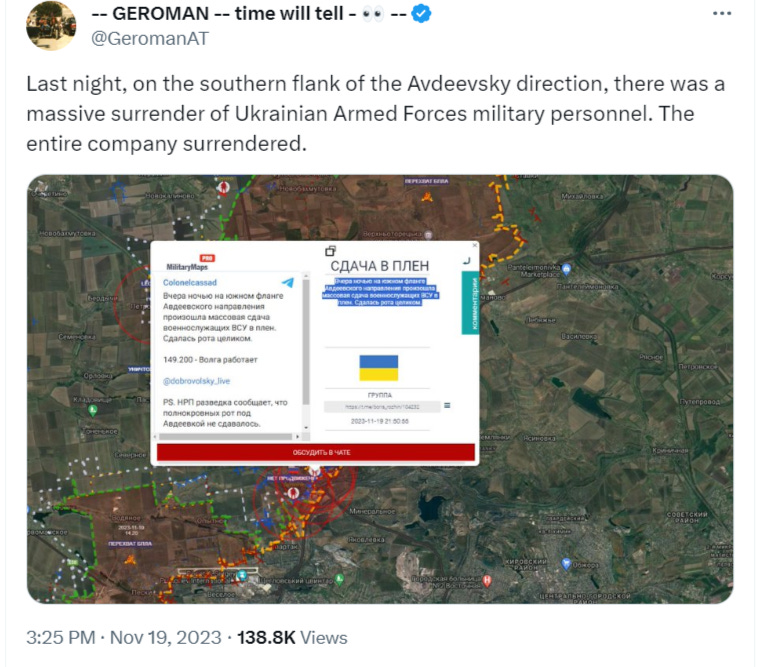
Uncorroborated and could be bogus, but there’s nothing comparable on the Russian side.
One brief note on this. Recall I posted Mediazona’s own confirmation that Russia is currently seeing its lowest casualties of the entire war:
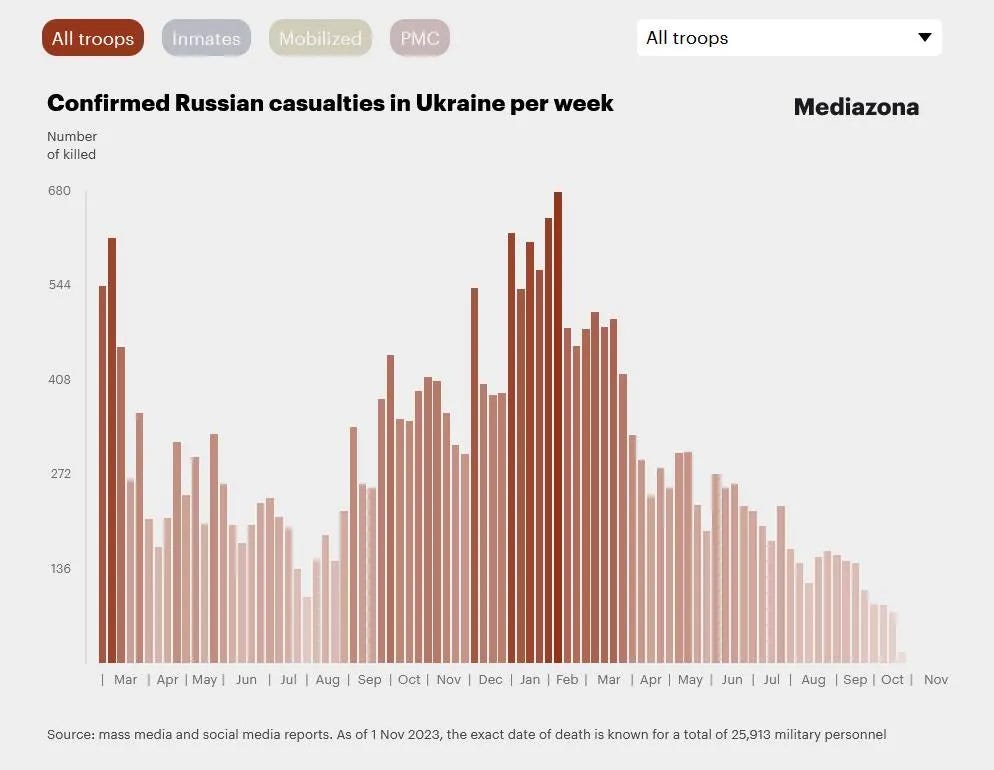
Once this got around, the operative excuse on the UA side of the blogosphere was that “Mediazona must be counting only Russian obituaries and not Donbass ones.”
Firstly, this is strange—why would they do that when the Donbass republics are now officially part of Russia? Statistically, administratively, etc., it would be no different than counting Russian casualties.
Secondly, even if that were somehow the case, do you realize that this proves my entire point, which I made several articles ago, that Russia proper is not taking any casualties in Avdeevka? That’s because it’s mostly DPR brigades engaged in the fighting there, which means the dead are not filling up cemeteries in the actual centers of political power/influence in the Russian mainland. So either way, it would go towards my point that the casualties in Avdeevka are not politically or societally significant for Russia. If the ledgers are showing almost no Russian losses even from UA sources, then it doesn’t much matter to Russia politically, callous as it sounds.
But going on to the more interesting points. The article states that this ‘elite’ 47th was transferred to Avdeevka in mid-October. So “Ivan’s” entire platoon was already wiped out just since then.
The article then reports that 30% of the 47th’s soldiers, i.e. 2000 out of 5000, died in Zaporozhye during the ‘counteroffensive’, pretty much confirming the massive losses there. Recall that the 9 famous ‘Pentagon Leaks’ brigades took part, but then several others (territorial brigades, airmobile, etc.) came to assist. So upwards of 15-25 brigades can be said to have taken part, which would amount to 15-25 x 5000 = 75,000 – 125,000 men. If they all experienced roughly 30% losses that would be equivalent to 22,500 – 37,500 dead.
Though these are academic figures at this point, I only mention it because this represents one of the first ever “official” confirmations of the loss figures. Recall for months I posted various leaks, like recovered paperwork from a wrecked AFU brigade showing losses of 50% and more, but it was never affirmed officially.
To make matters worse, ‘Ivan’ says that Avdeevka is now worse than Zaporozhye for the 47th.
“But it’s psychologically worse in Avdiivka,” he adds, “because defending is morally harder than attacking, you have to pray, sheltered in the trench for four days, as long as the relays last, so that their artillery doesn’t kill you, and then resist assault and another assault by the infantry.”
Ivan goes on to say that the Russians are ‘superior in everything’:
But Ivan shakes his head from side to side in disapproval: minus in troop formation, he says, the Russians are superior in everything, and besides, they have resources to spare. “If they take the railroad tracks, they’ll send the armor again, and if 10 vehicles come out from their second line, our artillery will hit them, yes, but four will get through and reach their destination.”
Whether real or not, ‘Ivan’ reveals another startling detail about Russian forces:
Ivan understood in Zaporiyia the main difference between the Kiev and Moscow armies: his squadron surrounded a Russian position defended by professional soldiers of an airborne division. The latter ran out of ammunition and repeatedly urged them to surrender, according to his account.
The enemy blew themselves up with grenades: “I don’t know any Ukrainians who have done this. They have another conception of life: Russians are more prepared for war and to die.”
So, say what you want, but it seems the Ukrainians are learning the hard way that the Russians don’t play at war—ironically, they’re even more prepared to die for “this land” than the Ukrainians are, which should send a chilling message to anyone who thinks Russia will roll over.
They go on to reaffirm Russia’s increasing drone superiority, which saturates the space about them with a constant stream of Lancets, Orlans, FPVs, of all kinds. But the bigger surprise is the admission that there’s been a large noted increase in Russian ‘Zoopark’ counterbattery radars. Remember all the whinging months ago specifically on this account? How ‘corrupt’ Russian leadership refused to supply the proper counterbattery equipment, even leading to the dismissal of commander of the 58th Army General Ivan Popov?
Finally the most interesting part comes when M109 Paladin commander ‘Alexander’ reveals how badly the ammo situation has gotten. When he used to shoot 100-150 shells per day in the Zaporozhye and Bakhmut direction, he now can only shoot 15 rounds in Avdeevka.
But here’s the most startling admission:

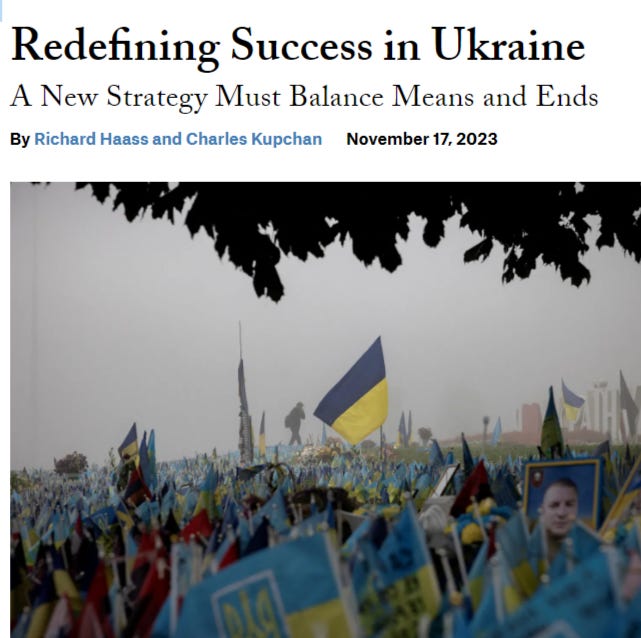


The world demands peace for Israel and hamas. But for some inexplicable reason, the world ignores the self genocide the Ukraine is engaged in.
Lost in the storm of words and headlines, two facts are ignored. The only party that Putin will negotiate with will be NATO. And, NATO is willing to let Putin keep 20% of Ukraine so they can put nuclear, biological and chemical weapons on his doorstep.
If NATO wanted it over, it would be over with the cessation of military supplies and support. Unfortunately for NATO, Putin is going to cast light on the affairs and should be successful in harming NATO’s credibility, as well as that of its members with the world community. Big win for his BRICS coalition.
There is no good reason to send any more money to Ukraine. Ukraine never had a chance to defeat Russia and now they risk depopulating themselves by sending more soldiers to die in a lost cause.